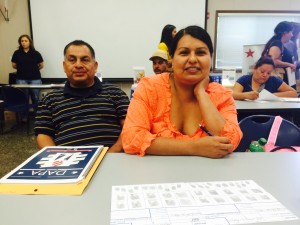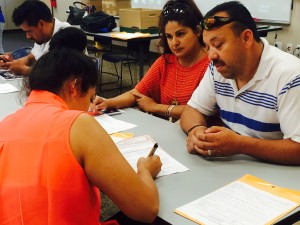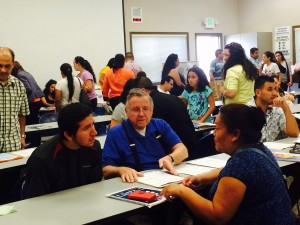by Juan Santiago
 The future of President Obama’s executive actions on immigration is still pending, in the hands of the courts. Meanwhile, California’s Attorney General and community groups began a series of community forums to help immigrants prepare to apply when and if DAPA and the expanded DACA go into effect. Still, they are alerting immigrants about possible fraud. The first forum was held in Stanislaus County, home to many undocumented youth and parents of citizen or permanent resident children. Our reporter Juan Santiago went to the meeting and has this report.
The future of President Obama’s executive actions on immigration is still pending, in the hands of the courts. Meanwhile, California’s Attorney General and community groups began a series of community forums to help immigrants prepare to apply when and if DAPA and the expanded DACA go into effect. Still, they are alerting immigrants about possible fraud. The first forum was held in Stanislaus County, home to many undocumented youth and parents of citizen or permanent resident children. Our reporter Juan Santiago went to the meeting and has this report.
Optimism permeates the room where more than a hundred people meet to find out more about how to prepare before the executive actions on immigration go into effect.
“In our county, we have an estimated 40,000 people who would qualify under the DACA and DACA programs. So there are a lot,” says Homero Mejía, director of the group Congregations Building Community, which organized the forum together with the office of the Attorney General of California.
Marisol León is deputy attorney general of civil rights.
“We want the community to know that during this period of uncertainty, the undocumented community has rights and we are all here to help and defend the community from swindlers,” says León.
The Attorney General is organizing forums like this all over the state. León says it is important especially right now.
“While the executive actions are frozen, this is an opportunity for swindlers to take advantage of the undocumented population, telling them that they already have applications for DAPA or that they can apply faster with them. So we want to alert the community that this is not true,” says León.
What León and Mejía do recommend is for undocumented immigrants who could qualify for DAPA or DACA to use this time to prepare all the documents they will need if the executive actions are implemented. They also recommend immigrants get their fingerprints done and ask the government for all information they have to see if they have a criminal record.
“Basically it’s so people can be prepared for the DAPA program. To see if the person has a history with Immigration or with the FBI. Then they will have a very clear idea that they don’t have anything on their record, or what to do to begin to clean up their record before the program begins,” says Mejía.
Many people were getting their fingerprints done at the community meeting.
One person who took her fingerprints was Casimira Díaz:
“I think if we wait until the last minute, we are going to be rushing. And we will need time to have our birth certificate, our tax records, all our work places, all the information they are going to ask us for. So it’s good for us to start now, so that we are not nervous at the last minute,” says Díaz.
Homero Mejia applauds this motivation. He says in the past, most presidential actions have been able to go into effect.
“If history tells us anything, executive action programs have never been stopped before, so we know that this is just taking a long time in the courts because of racism,” says Mejía.
The court is expected to hear arguments during the first week of July in favor and against the executive actions on immigration going into effect.
















